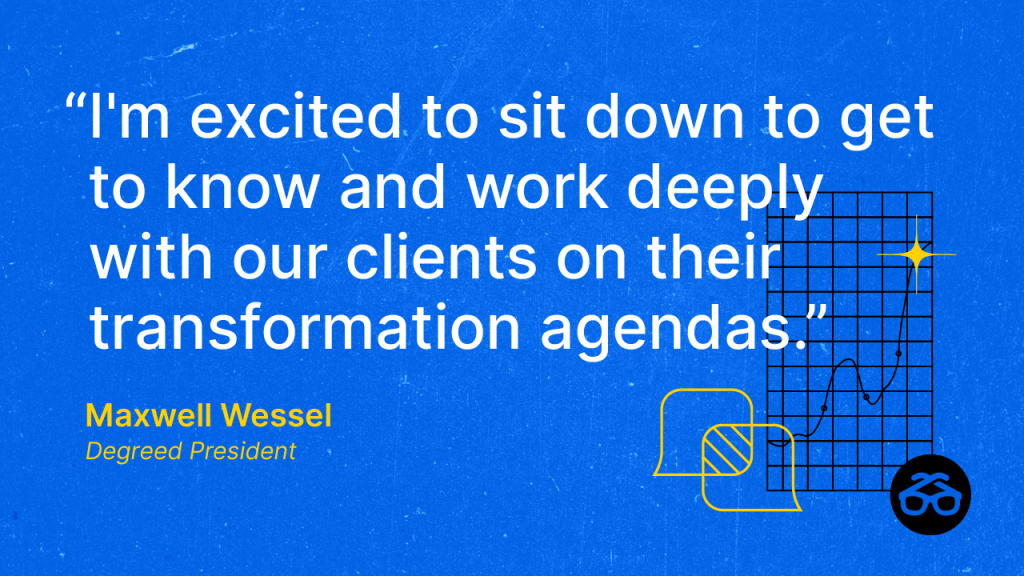These are exciting times here at Degreed. Our products are evolving. We’re looking forward to Degreed LENS, our annual flagship conference, which is only days away.
With this same enthusiasm, we’re welcoming Max Wessel, our new Degreed President. With his appointment, announced today, we’re a leader wiser and a big step closer to jailbreaking the college degree, our mission since day one.
We’ve been getting to know Max, and we recently sat down with some questions in hand so you can start to get to know him too. The result? An enlightening Q&A on the future of L&D and technology in skill building, what’s next for Degreed, and his personal passion. (Spoiler alert: it’s delicious barbecue.)
Welcome, Max! Let’s get right into some questions. What drew you to Degreed?
Max: Thank you. I think there are only a handful of companies today that have the ability to help companies realize the value of a skills-based organization, and I feel passionately about that transition. When someone’s career spans 60 years following their graduation from university, there’s simply no way companies can rely on the engine for education and training that existed through the 20th century to carry them forward into the 21st century.
That’s something that I believed before I came to Degreed. It’s something that drove me while I was running the SAP Learning business. I’ve seen the positive outcomes. People have more opportunities when you can credential them. People have faster career growth when you can ensure that the learnings they need are at their fingertips. People pick themselves up by their bootstraps when they have bootstraps.
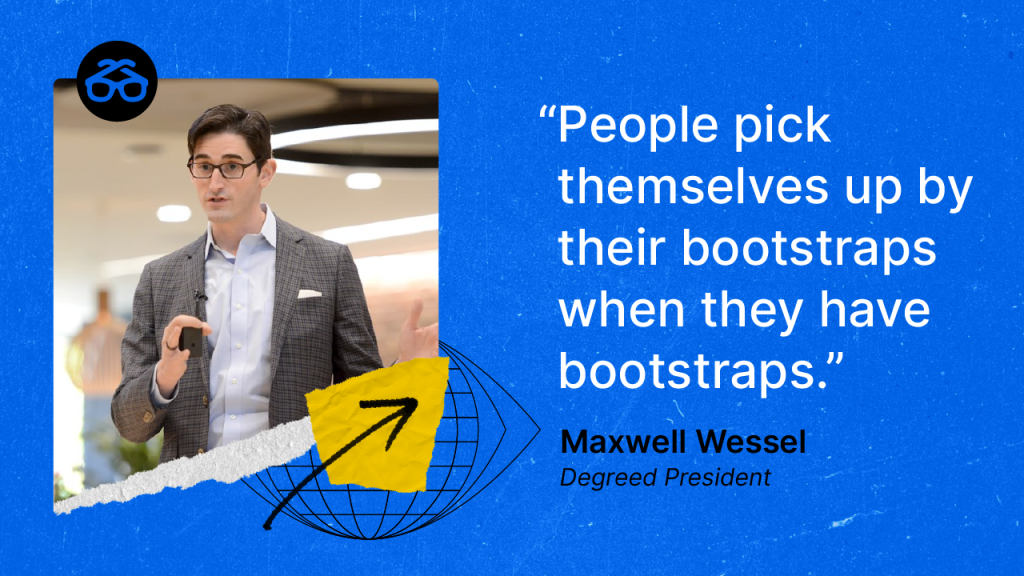
When I look at the market, Degreed is the best platform for giving people access to the training materials and the skill signaling that accelerates career growth. And that was what got me excited. I wanted to come to an organization that already transformed corporate learning and help further transform the world of career mobility and training. There’s no more important mission. There’s no more exciting mission.
You’ve had a significant career in the B2B SaaS learning world. What unique perspectives do you bring to the Degreed mission? What excites you most about this space and the company’s potential impact?
Max: If Degreed is going to be successful in its mission to jailbreak the degree, Degreed is going to have to have broad-scale adoption. It’s going to have to have set the standard for how skill signaling and credential equivalency happen.
Dave Blake [Degreed CEO] has an inspiring vision about this future. When we got to know each other, we hit it off quickly—in part because the things Degreed needed to learn were those lessons that I’d learned across my years in later-stage SaaS. And the things that will drive the market forward are those where Dave and Degreed have a unique perspective on the market. I see my job as helping to make sure that we can capture more hearts and minds across the world’s largest enterprises.
The game for Degreed right now is to translate the company’s vision into the steps that make it easier for our customers to deploy, that make it easier for learners to transact, and that make it easier for our systems to talk to other systems in the enterprise. Helping the team accomplish the task is what gets me excited.
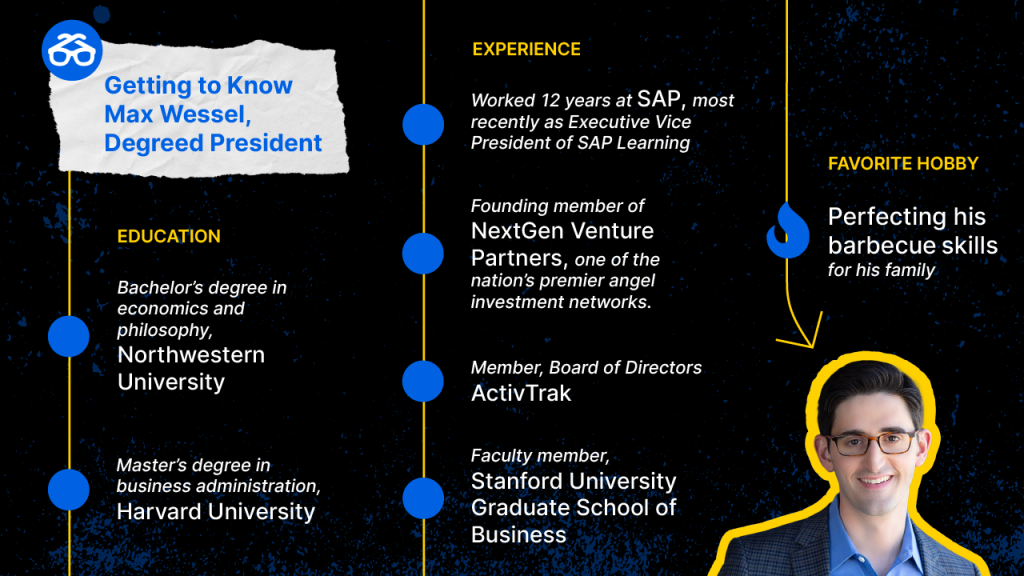
Amid all the enthusiasm for skills-based organizations today, what do you see happening in L&D over the next three to five years?
Max: From 2010 to 2020, companies democratized learning content. From 2020 on, they’re going to have to reform how they use that content, how they target and personalize training, and how they keep people up to speed.
In a skills-based organization, it’s a lot easier to target individuals with relevant content and keep them up to speed than to ask them to learn everything the average person in their role needs. Today, we’re basically saying, “You’re the median of people with your title, so here are all the average requirements and contents for you.” That’s not how people should learn in a world that moves as fast as the one we’re in. You want the things that push your strengths or accommodate your gaps. You want to avoid being forced to click through trainings of things you already know. You want learning to help you accelerate. Delivering skills-first learning, powered by the types of AI now available in the world, unlocks that type of personalization.
By the way, that type of personalization and speed is what every CEO wants out of their learning investment. An organization that is wasting time in its skilling effort isn’t building the strength it needs in areas that are moving fast today like Gen AI, Sustainability, or Cloud.
The flip side of all this is that there’s a lot of enthusiasm around SBOs. Maybe too much from a more academic perspective. For L&D professionals, for CHROs, and for CEOs who are trying to drive a transformation, doing everything at once won’t work. You can change your recruiting processes. You can change your internal mobility processes. You can deliver personalized learning at every stage of the equation. But the reality is that changing your entire people function all at once will never be successful. So the better way to start is to think, “For a critical role or a critical skill, how do I cascade knowledge into my organization and, one step at a time, start to realize a faster, more dynamic workforce change?”
You’ve described a process. It’s not a one-and-done, and it’s not a quick fix. What role do you see technology playing in the future of skills-based learning? What role will Degreed and Degreed technology play?
Max: If you’re sitting in a CEO’s chair, you want to set priorities and identify risks. You want to be able to say, “We need to know how to deploy generative AI to drive business efficiency across our finance, HR, and support functions.” It’s that simple. The CEO wants to establish direction and identify risks for CHROs and CLOs.
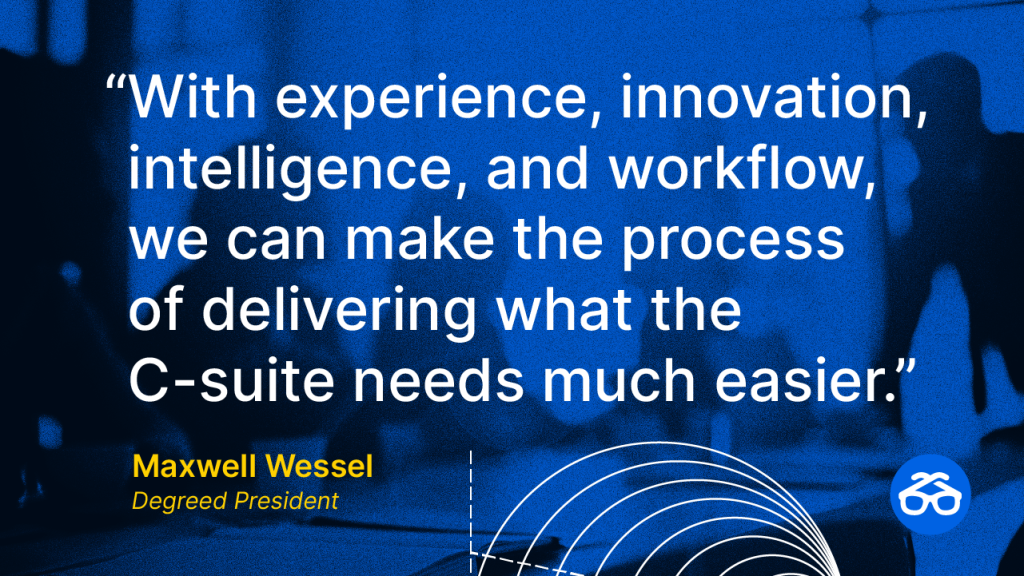
At Degreed, we want to make it simple for those CHROs and CLOs tasked with the change to identify those skills and take action. We want to deliver some-part-experience, some-part-intelligence, and some-part-workflow that makes it simple to drive improvement quarter after quarter. If you have the right software, your system should be able to help you answer where you have the right talent and where you have gaps, where you need deep reskilling programs, and which programs you deploy are the most effective in driving skill progression.
That is a big data problem that can’t be overcome with spreadsheet-driven experiences. The unique power Degreed has is an integrated view of skills and learning activity. We have skill signals on every employee in an organization. We have the learning content in our platform that we can present and prioritize based on needs. With experience, innovation, intelligence, and workflow, we can make the process of delivering what the C-suite needs much easier.
How will you help ensure that the Degreed mission stays core to what we’re doing as a company as we continue to grow and evolve?
Max: The great thing about the mission that we have is it’s very much in line with our customers’ needs. Take a growing skills gap in the workforce—for instance, a need for more technologists. Even if we graduate high-quality professionals out of every undergraduate and graduate technical program in the world, there’s no way to use the traditional process to address the current problem.
Organizations have to come up with new ways of creating skilled individuals that can be hired into these roles. The overlap with our mission is actually quite powerful. It means if we can do the right thing to assess skills to create credential equivalencies, our customers will embrace that and use it to fill gaps.
I’m excited to sit down to get to know and work deeply with our clients on their transformation agendas. We succeed in jailbreaking the degree when we can successfully help our clients and customers not only deliver against their everyday learning needs but also drive deep upskilling and re-skilling. My focus is entirely on how we can help them be successful in that journey. And the only way to get there is together.
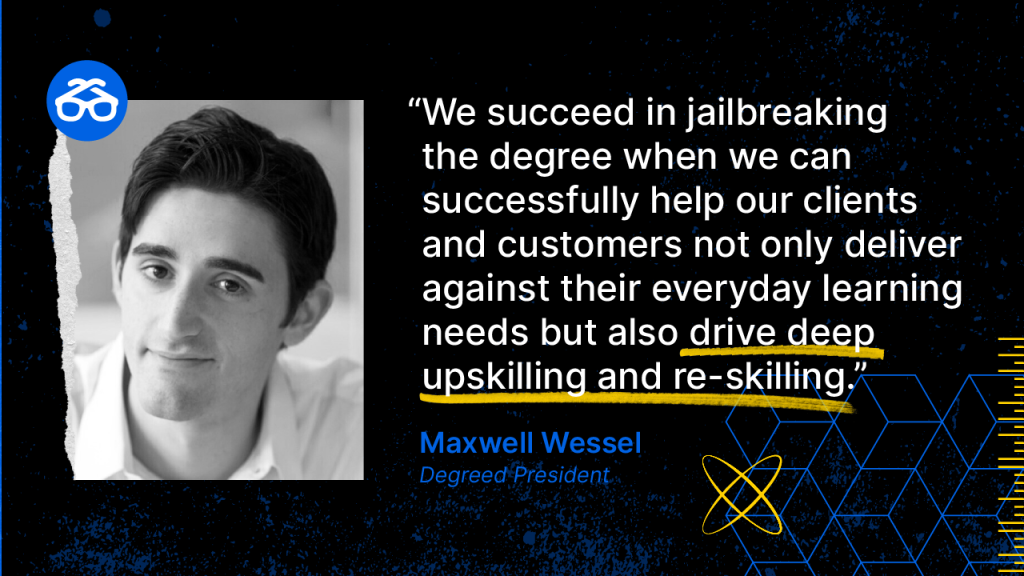
Who’s your favorite non-work-related expert?
Max: Jeremy Yoder at Mad Scientist BBQ. First, I need to say that I love barbecue. Jeremy Yoder is a YouTuber who is excellent at teaching how to barbecue. I find it amazing that what is a very physical, sensory filled, process is something that he can deliver content about via video exclusively.
Are you currently building expertise in barbecue, or do you just admire it from afar?
Max: We have four wood fire barbecues—and I still have a lot of learning to do! I’m always in pursuit of getting better.
What would you consider yourself an expert in? Professionally and also personally?
Max: Professionally, I came up on the product management side of the world, so Product and UX. That’s where I started as an expert. And I think it’s really important for people to be T-shaped. You have to be deep somewhere before you can go broad to really understand a function. Product UX is the function that I understood, and I used that to learn more about the business and then get broader over time.
Cooking really is my passion outside of work. Barbecue or otherwise. Cooking is my artistic expression.
